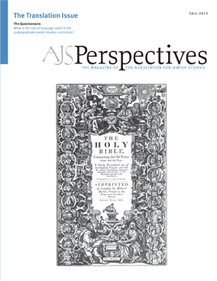Dear Colleagues,
How someone gets on the AJS Board of Directors seems to be, unintentionally, one of the best kept secrets. AJS recently appointed a governance committee, chaired by Robin Judd and including Judith Baskin, David Freidenreich, and Joel Berkowitz, charged with, among many tasks, examining the AJS board nominations process and ensuring greater transparency. Although the board election system is outlined in the AJS bylaws, available at www.ajsnet.org/bylaws.htm, this webpage is not exactly setting Google Analytics records. I thus hope this column will demystify the board election process, and encourage more people to get involved.
AJS's Board of Directors consists of five officers (president, vice president for membership, vice president for program, vice president for publications, and secretary/treasurer) and eighteen regular directors. In addition, the past two presidents sit on the board, as do the editors of Perspectives and AJS Review (ex officio). Regular director terms are three years; officer terms are two years. As noted in Article IV, Section 3 of the AJS bylaws the board is charged with the general direction, management, and control of AJS. On a practical level, this means oversight of AJS's projects, mission, and finances.
Each December, AJS's president submits to the board for approval the names of seven people to serve on the nominating committee, which is charged with creating a slate of board nominees. The 2015 nominating committee consists of: Beth Berkowitz, Sara Horowitz (chair), Charles Manekin, David Myers, Shachar Pinsker, Riv-Ellen Prell, and Steve Weitzman. They were selected for the breadth of fields and regions they represent, their leadership experience, as well as their firsthand knowledge of AJS board and committee work.
The committee next seeks suggestions of director nominees by reaching out to various constituencies, including the heads of divisions, caucuses, standing committees, and editorial boards, as well as current board members. These leaders are reminded that the AJS board strives to reflect the diversity of the field of Jewish Studies with respect to discipline, region, type of institution, stage of career, and gender. Suggested nominees' familiarity with AJS—through regular attendance at its conferences, involvement in publications, or other undertakings—is also very important, as well as people's desire to be further involved in AJS and their leadership role at their home institutions or other organizations. AJS welcomes as nominees professors as well as scholars who work both within and outside of academia (i.e. in museums, archives, historical societies, libraries, nonprofits, etc.). Eligibility to serve on the executive committee is a bit narrower, requiring current or past service on the board or program committee, or as a division chair or editor of an AJS publication. In order to be eligible for the presidency, someone must either currently be an officer, or have served as an officer within the previous four years.
The nominating committee spends several weeks over the spring and summer developing a list of potential nominees. Once that list is finalized and the individuals agree to join the slate, the list is shared with the president of AJS and, finally, with the full membership, a month ahead of the annual conference. The chair of the committee formally presents the slate at the annual business meeting, this year to be held December 13 at 1:15 pm at the Sheraton Boston. Election is by majority vote of the members present at the business meeting.
So what do you do if you are interested in serving on the AJS board? Get involved: contact the AJS office or an officer about your interest in serving on a committee or an editorial board, as a division chair or a volunteer in some other capacity. Board service is as much about excellence in scholarship as it is about having administrative, program-building, fundraising, and other such experience that can help AJS grow. Also be on the lookout for communication about new ways AJS seeks to involve members in the nominations process. As always, I welcome your thoughts. Please feel free to contact me at rsheramy@ajs.cjh.org.
Rona Sheramy
Association for Jewish Studies

